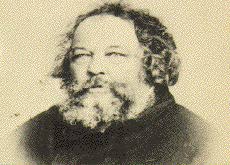
Professor Dana Ward Office Hours: Avery 207 Mon:& Wed 2:00-3:00 Extension 3177 Tues & Thur 11:00-12:00

Perhaps because it is so little studied, anarchism is among the most misunderstood political theories and movements. This course will examine the long history of anarchist movements and the writings of the most important anarchist theorists. We shall examine the struggle between Marx and Bakunin for control of the First International, the Spanish Civil War, and the various anarchist experiments in the U.S., as well as a number of other important moments in the history of anarchism. We will read Kropotkin, Bakunin, Bookchin, and others and relate their work to the broad range of political philosophies.
The course will consist of a series of lectures, discussions, reports, and several short papers. We will be meeting only once a week for three hours. In general, I will lecture for one third of the time, we will discuss issues for one third of the time, and class members will present reports and special projects during the last third of the session. You should be aware that in my view you are the only person responsible for your education. You must take an active part in that process and act responsibly. If you expect to sit back and have me do your thinking for you or entertain you, you will be disappointed. I hope to challenge you, at times to guide you, and to provide you with as much intellectual stimulation as my abilities permit, but learning requires autonomy and initiative, and this you must provide. I expect you to challenge me and to question my assumptions. In the process I expect to learn at least as much from you as you may chance to learn from me.
Grades will be assigned on the basis of the following criteria:
1) Ten percent of your grade will be based on your own self- evaluation. On Sept 13 you will each submit a statement of your goals for the course. This statement should be as specific and detailed as possible. Plan your method for meeting the responsibilities of this course, set weekly goals and time schedules or whatever will help you to think about why you are taking this particular course and how it fits your over-all learning goals. Then, on the last day of class you will turn in a self-evaluation in which you will analyze how well you met your goals, how your goals changed, and what unforeseen goals emerged. You then will assign yourself an over-all grade based on your total performance in this course.
2) Ten percent of your grade will be based on peer evaluations. In essence, this is your participation grade. Each of you will evaluate each of the other seminar members based on that person's contribution to your own education. Use a separate piece of paper for each student being evaluated. Write as thorough an analysis as possible of the student's strengths and weaknesses and any suggestions for improvement. Then assign that person a letter grade. These grades will all be averaged and will be ten percent of the final grade for the course.
3) There will be three five page papers due on the first class meeting of each month, starting in October. All topics must be cleared with me. You may write the papers in any order, but one must be on one particular thinker, one must be on a particular movement in a single country, and one must compare either two thinkers or two movements, but cannot cover a subject covered in the other short papers. These papers must be fully documented with footnotes and a bibliography. I will be happy to read drafts if sufficient time is provided. Each paper will constitute fifteen percent of your final grade.
4) A final paper is due during final exam week. This paper will be approximately fifteen pages in length and will be a critique of anarchism. You should be working on this paper all semester. If you wait until the end of the semester you will do an inadequate job. The final paper will constitute thirty-five percent of your final grade.
All readings are required and must be read before the date listed, with the exception of the Sept 6 reading which will be read in class. Copies of all readings are on reserve at Honnold.